

Have you ever wished for a magical tool that could help you make informed trading decisions effortlessly? Trading signals can feel like that crystal ball, offering insights into market movements before they happen. But what are these signals, and how do they function?
What are trading signals?
Trading signals act like navigational beacons for traders, guiding them on when to buy or sell assets in the market. Think of them as traffic indicators: a green light means go ahead and make a purchase, while a red light signals it's time to sell. These signals are derived from various sources. Technical signals arise from chart analysis, revealing patterns like head and shoulders or cup and handle. Conversely, fundamental signals come from news events, such as an earnings announcement that suggests a stock's price is likely to rise. Whether generated from technical analysis or based on fundamental news, these signals provide critical guidance for traders.
Varieties of trading signals
Trading signals can take on several forms, each designed for distinct trading styles and preferences. Let’s delve into the various types:
Day trading signals
Day trading signals are tailored for those who aim to profit from small price fluctuations within the same trading day. Traders often utilize minute or 5-minute charts to identify quick trading opportunities. While technical analysis predominantly drives these signals, occasional fundamental factors, like significant news releases, can also play a role. Day trading typically focuses on highly liquid assets with tight spreads, including major and minor currency pairs, cryptocurrencies such as Bitcoin and Ethereum, well-known stocks, indices like the DE 40, and commodities like gold.

Swing trading signals
In contrast to day trading, swing trading signals target price movements that occur over several days or weeks. These signals appeal to traders who prefer to take advantage of larger trends without the need for constant market monitoring. Swing trading allows for engagement with assets with lower liquidity, making it an appealing choice for individuals with full-time jobs. Traders can explore a broader spectrum of assets, including smaller-cap stocks, exotic forex pairs, and lesser-known cryptocurrencies.
Forex trading signals
Forex trading signals focus on the currency market, where traders speculate on the relative strength of various currencies. Major pairs like EUR/USD, USD/JPY, and USD/CHF dominate this landscape due to their high liquidity. Traders employ chart analysis to predict currency movements and seize opportunities for buying or selling. While major and minor pairs are popular choices, exotic pairs like EUR/SGD or USD/NOK are generally suited for long-term strategies because of their wider spreads.
Benefits and drawbacks of using trading signals
| Benefits of trading signals | Drawbacks of trading signals |
|---|---|
| Time Efficiency: Trading signals can significantly streamline the decision-making process, saving traders precious time by offering explicit guidance on when to act. Instead of constantly analyzing the markets, traders can rely on signals to pinpoint opportunities effectively. For instance, a busy individual with limited time for analysis might subscribe to trading signals, allowing for timely trades without extensive research. | Complacency: Some traders may view trading signals as a shortcut to success, which can result in a lack of dedication to learning and understanding market dynamics. Relying exclusively on signals without grasping the underlying principles may hinder long-term success. For example, a trader might subscribe to multiple signal services without investing time in understanding trading strategies, expecting signals to generate profits with minimal effort. |
| Risk Mitigation: Utilizing trading signals can help minimize risk by offering direction grounded in established strategies and indicators. Following signals from credible sources enables traders to make informed decisions rather than impulsive ones. For example, a newcomer to trading might follow signals provided by seasoned analysts, lowering the chances of costly mistakes often caused by inexperience or emotional trading. | Cost Considerations: High-quality trading signal services often come with substantial subscription fees, particularly from reputable analysts or algorithmic trading platforms. These expenses can erode profits, especially for traders with limited capital. For instance, a trader on a tight budget may subscribe to an expensive signal service, only to find that the monthly fees surpass their trading profits, ultimately affecting their overall returns. |
| Educational Value: Trading signals can serve as invaluable educational tools, providing insights into effective trading strategies and market dynamics. By observing how signals are generated and executed, traders can enhance their market comprehension and hone their skills over time. For instance, an aspiring trader might subscribe to a signal service not just to receive trade suggestions but also to learn from the reasoning behind each signal, gaining crucial knowledge for future self-directed trading. | Loss of Autonomy: Relying heavily on trading signals can lead to a loss of control over one's trading choices. Traders might become overly dependent on signals, relinquishing their ability to adapt to changing market conditions. For instance, a trader might become so reliant on signals that they hesitate to deviate from the suggested actions, even when market circumstances necessitate a change, leading to missed opportunities or heightened losses. |
Experience Skilling's award-winning platform
Try out any of Skilling’s trading platforms on the device of your choice across web, android or iOS.

Conclusion
While trading signals offer numerous advantages, it is crucial for traders to remain cautious and complement signal-driven strategies with comprehensive market analysis and continuous education.
Frequently asked questions
1. What are trading signals?
Trading signals are indicators or alerts that suggest optimal times to buy or sell a financial asset. They are generated through various methodologies, including technical analysis, fundamental analysis, or algorithmic trading systems.
2. How do trading signals function?
Trading signals operate by scrutinizing market data and pinpointing potential trading opportunities based on pre-established criteria. These criteria may involve price patterns, technical indicators, news events, or economic data.
3. What assets can trading signals cover?
Trading signals can encompass a broad array of assets, including stocks, forex (foreign exchange), cryptocurrencies, commodities, and indices. The specific assets depend on the signal provider and the trader's preferences.
4. Who supplies trading signals?
Trading signals can be offered by individual traders, professional analysts, financial institutions, or automated trading systems (bots). There are also dedicated signal service providers offering subscription-based services for traders.
5. Are trading signals dependable?
The reliability of trading signals can vary based on the methodologies employed and the precision of the analysis. While some signals may prove to be more dependable than others, no signal can guarantee trading success. It's essential for traders to carefully evaluate signals and consider additional factors before making trading decisions.
6. How can I effectively utilize trading signals?
To use trading signals effectively, traders should engage in thorough research, grasp the methodologies behind the signals, and assess their risk tolerance and trading objectives. Incorporating signals into a comprehensive trading strategy is vital, rather than relying solely on them for decision-making.
7. Are there free trading signals available?
Yes, various sources provide free trading signals, including online forums, social media platforms, and some trading platforms. However, free signals may not always be as reliable or comprehensive as those provided by paid signal services or professional analysts.
8. Can I automate trading based on signals?
Yes, traders can automate their trading based on signals using algorithmic trading systems or trading bots. These systems execute trades automatically according to predefined criteria and can be programmed to include trading signals in their decision-making processes.
9. How do I select the right trading signal provider?
When choosing a trading signal provider, consider their track record, reputation, transparency, and signal accuracy. It's also crucial to evaluate the service costs and whether they align with your trading goals and financial situation.
10. Can trading signals guarantee profits?
No, trading signals cannot guarantee profits, as trading inherently involves risks. While signals can provide valuable insights and opportunities, achieving success in trading depends on numerous factors, including market conditions, risk management, and the trader's skills and discipline.
What better way to welcome you than with a bonus?
Start trading with a $30 bonus on your first deposit.
Terms and Conditions apply












